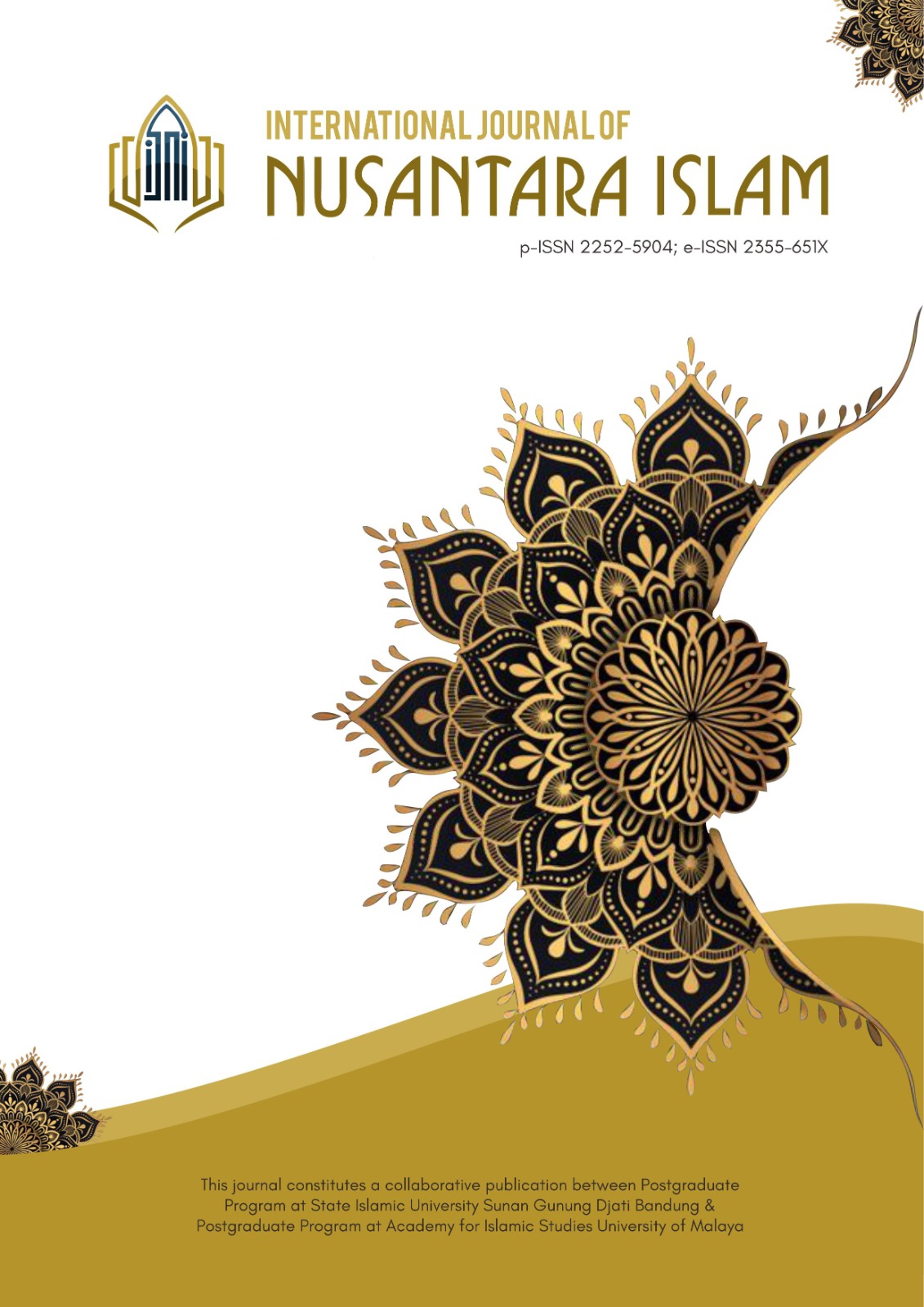The Concept of State and Government in Ibn Khaldun’s Thought
Main Article Content
Abstract
Article Details
The Authors submitting a manuscript do so on the understanding that if accepted for publication, copyright of the article shall be assigned to International Journal of Nusantara Islam, Sunan Gunung Djati State Islamic University.
The copyright encompasses exclusive rights to reproduce and disseminate articles in all forms and media, including reprints, photographs, microfilm, and similar reproductions, as well as translations. Some or all of the contents of this journal can be stored in databases and transmitted in any form and media without the need for written permission from the International Journal of Nusantara Islam, Sunan Gunung Djati State Islamic University.
The Editors and the Advisory International Editorial Board make every effort to ensure that no wrong or misleading data, opinions or statements be published in the journal. In any way, the contents of the articles and advertisements published in the International Journal of Nusantara Islam (IJNI) are sole and exclusive responsibility of their respective authors and advertisers.
References
Ahmad, K. J. (1996). Seratus Muslim terkemuka. Jakarta: Pustaka Firdaus.
Ahmad, Z. (2004). The Epistemology of Ibn Khaldun. New York: Routledge.
al-Jâbiry, M. ‘Abid. (1995). Naqd al-Aql al-Araby III; al-Aql asSyiyasi al-Araby, Muhaddadâtuhu wa Tajliyatuhu. Beirut: Markaz Dirâsât al-Wihdah al-’Arabiyyah.
al-Khudairi, Z. (1987). Filsafat Sejarah Ibn Khaldun. Bandung: Pustaka.
al-Tanji, M. I. T. (1951). Al-Ta’rif bi Ibni al-Khaldun wa Rihlatuhu Ghharban wa Syaman,. Misr: Lajnah al-Ta’lif wa al-Tarjamah wa al-Nashr.
Alatas, S. F. (2014). Applying Ibn Khaldūn: The Recovery of a Lost Tradition in Sociology. New York: Routledge.
Al-Azmeh, A. (2012). Ibn Khaldun: A Reinterpretation. New York: Routledge.
Browning, D. S., & Bunge, M. J. (2009). Children and Childhood in World Religions: Primary Sources and Texts. Brunswick: Rutgers University Press.
Faghirzadeh, S. (2008). Sosiologi Sosiologi. Kuala Lumpur: ITBM.
Fromherz, A. J. (2011). Ibn Khaldun. Edinburg: Edinburgh University Press.
Goitein, S. D. (2010). Studies in Islamic History and Institutions. Leiden: BRILL.
Halim, H., Aziz, H. S., Suhaimy, K. A. M., Ani, F., Jaes, L., Ahmad, S., … Bakar, S. K. S. A. (2018). THE PRINCIPAL THINKING OF IBN KHALDUN: AN ANALYSIS ON THE CONTRIBUTION TO THE DEVELOPMENT OF CONTEMPORARY SCIENCE. Proceedings of The International Conference on Social Sciences (ICSS), 1.
Kassab, E. S. (2009). Contemporary Arab Thought: Cultural Critique in Comparative Perspective. New York: Columbia University Press.
Khaldûn, I. (2015). The Muqaddimah: An Introduction to History - Abridged Edition (B. B. Lawrence, Ed.). New York: Princeton University Press.
Lovat, T., & Moghadam, A. (2017). The History of Islam: Revelation, Reconstruction or Both? Cham: Springer.
Maarif, A. S. (1996). Ibn Khaldun dalam Pandangan Penulis Barat dan Timur. Jakarta: Gema Insani.
Madjid, N. (1997). Kaki Langit Peradaban Islam. Jakarta: Paramadina.
Misbâh, al-آ. (1988). Ibnu Khaldun; Wa Tawaffuq al-Fikr al-Araby ‘Ala al-Fikr al-Yûnâny bi Iktisyâfihi Haqâiq al-Falsafah. al-Dâr al-Jamâhîriyyah li an-Nasyr wa at-Tauzî’ wa al-I’lân.
Moss, L. S. (1996). Joseph A. Schumpeter: Historian of Economics: Perspectives on the History of Economic Thought. New York: Routledge.
Noer, D. (1998). Pemikiran Politik di Negeri Barat. Bandung: Mizan.
Suharto, T. (2003). Epistemologi Sejarah Kritis Ibnu Khaldun. Yogyakarta: Fajar Pustaka Baru.
Zainuddin, A. R. (1992). Kekuasaan dan negara: Pemikiran politik Ibnu Khaldun. Jakarta: Gramedia Pustaka Utama.

